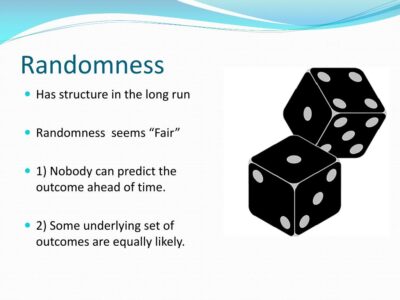Randomness is a concept that permeates every aspect of our lives. From the roll of dice in games to the unpredictable patterns of nature, randomness s
Randomness is a concept that permeates every aspect of our lives. From the roll of dice in games to the unpredictable patterns of nature, randomness shapes our world in ways that are both mysterious and fundamental. But what exactly is randomness? How do we understand and measure it? And why does it matter?
In this article, we’ll dive deep into the world of randomness—exploring its definitions, examples, applications, and the philosophical questions it raises. We’ll also answer some of the most frequently asked questions about randomness to give you a clearer picture of this intriguing concept.
What is Randomness?
At its core, randomness refers to the lack of pattern or predictability in events. When something is random, it means its outcome cannot be precisely predicted, even if we know all the conditions beforehand. For example, flipping a fair coin is a random event because the result—heads or tails—is equally likely and cannot be predicted in advance.
Randomness contrasts with determinism, where events follow specific causes and effects that make future outcomes predictable. However, in many systems, especially in nature and human activities, randomness plays a significant role.
Types of Randomness
1. True Randomness
True randomness is the kind of randomness that is fundamentally unpredictable, often arising from physical processes. Examples include radioactive decay, thermal noise in electronic circuits, or atmospheric noise. True randomness is intrinsic and does not arise from a lack of knowledge but from the inherent uncertainty in nature.
2. Pseudo-Randomness
Pseudo-randomness is generated by algorithms in computers to mimic randomness. These sequences appear random but are actually deterministic and reproducible if the initial conditions (seed) are known. Although pseudo-random numbers are not truly random, they are sufficient for most practical applications like simulations and cryptography.
Randomness in Nature
Nature is full of randomness, often in complex and beautiful ways:
- Weather: Weather patterns involve chaotic systems where tiny changes can lead to vastly different outcomes, making long-term predictions difficult.
- Genetics: Genetic mutations occur randomly, driving evolution and biodiversity.
- Quantum Mechanics: At a fundamental level, particles behave probabilistically, and outcomes of measurements are inherently random.
- Animal Behavior: Many animals exhibit random patterns to confuse predators or adapt to changing environments.
The Role of Randomness in Science and Technology
Randomness is not just a philosophical or natural curiosity; it has practical importance in many fields:
1. Statistics and Probability
The mathematical study of randomness is known as probability theory. It helps scientists and researchers model uncertainty, make predictions, and analyze data. Random sampling methods are crucial in surveys and experiments to ensure unbiased results.
2. Cryptography
Randomness is the backbone of secure communication. Encryption systems rely on random keys to protect information from unauthorized access. Without good sources of randomness, cryptographic protocols would be vulnerable to attacks.
3. Computer Science
Algorithms use randomness in tasks like randomized algorithms, simulations, and gaming. Randomness helps optimize processes, break symmetry, and provide unpredictability.
4. Physics
Randomness is fundamental in quantum mechanics. Phenomena such as radioactive decay or photon polarization are inherently probabilistic, influencing how we understand the universe.

Philosophical Questions About Randomness
Randomness raises profound questions that have been debated by philosophers and scientists:
- Is the universe fundamentally random or deterministic? Classical physics suggested a deterministic universe, but quantum mechanics introduced inherent randomness.
- Can true randomness exist? Some argue all randomness arises from ignorance of underlying variables (hidden variables), while others accept fundamental randomness.
- How does randomness relate to free will? If events are random, does that imply a lack of control? Or can randomness coexist with meaningful choices?
Everyday Examples of Randomness
Understanding randomness helps us in everyday life:
- Games: Dice, cards, and lottery draws rely on randomness to ensure fairness.
- Decision Making: Sometimes, people use random choices to make decisions, like flipping a coin or drawing lots.
- Traffic: The timing of cars arriving at an intersection can often be modeled as random, aiding traffic flow optimization.
- Health: The random mutation of viruses affects disease spread and vaccine development.
How Do We Measure Randomness?
Measuring randomness is a challenge. Some key concepts include:
- Entropy: In information theory, entropy quantifies the unpredictability of data. Higher entropy means more randomness.
- Randomness Tests: Statistical tests like frequency tests, runs tests, and autocorrelation tests evaluate if a sequence behaves randomly.
- Algorithmic Randomness: This approach defines randomness based on the complexity of describing a sequence; a truly random sequence cannot be compressed.
Can We Control Randomness?
While we cannot control true randomness, we can manage its effects:
- Random Number Generators: Computers use algorithms combined with physical processes to produce random numbers.
- Randomized Algorithms: These use randomness strategically to solve problems more efficiently or fairly.
- Random Sampling: In research, random sampling ensures unbiased representation.
The Future of Randomness Research
Ongoing research explores deeper questions about randomness, such as:
- Harnessing quantum randomness for ultra-secure communication.
- Understanding randomness in complex systems like the brain and ecosystems.
- Improving randomness tests to distinguish true from pseudo-randomness.
- Exploring randomness in artificial intelligence to create more adaptive systems.
Frequently Asked Questions (FAQs) About Randomness
Q1: What is the difference between randomness and chance?
A: Chance is often used synonymously with randomness but generally refers to the likelihood of an event occurring. Randomness emphasizes unpredictability and lack of pattern, while chance is a measure of probability.
Q2: Is randomness the same as chaos?
A: No. Chaos refers to deterministic systems that are highly sensitive to initial conditions, making them appear random. Randomness, on the other hand, is inherent unpredictability without underlying determinism.
Q3: Can computers generate truly random numbers?
A: Most computer-generated random numbers are pseudo-random, created by algorithms. However, computers can generate true random numbers by using physical processes like atmospheric noise or radioactive decay.
Q4: Why is randomness important in cryptography?
A: Randomness is essential for generating secure cryptographic keys. If keys are predictable, attackers can easily break the encryption, compromising security.
Q5: How does randomness affect scientific experiments?
A: Randomness helps reduce bias by enabling random sampling and assignment. It ensures experiments are fair and results are generalizable.
Q6: Can randomness be predicted?
A: True randomness cannot be predicted because it lacks any pattern. Pseudo-random sequences can be predicted if the initial conditions or algorithm are known.
Q7: What is an example of randomness in nature?
A: Genetic mutations occur randomly and play a key role in evolution.
Q8: How is randomness measured?
A: Randomness can be measured using statistical tests, entropy in information theory, and complexity measures in algorithmic randomness.
Q9: Is randomness necessary for innovation and creativity?
A: Yes, randomness can lead to unexpected outcomes and novel ideas, fostering creativity and innovation.
Q10: Does randomness exist in quantum mechanics?
A: Yes, quantum mechanics describes certain phenomena, like particle behavior, as inherently probabilistic and random.
Randomness is a captivating concept that challenges our understanding of the world. It is both a source of unpredictability and a powerful tool that shapes science, technology, nature, and even philosophy. Embracing the unpredictability of randomness allows us to better navigate uncertainty and appreciate the complexity of life.
Must Visit: spotlightlive




COMMENTS